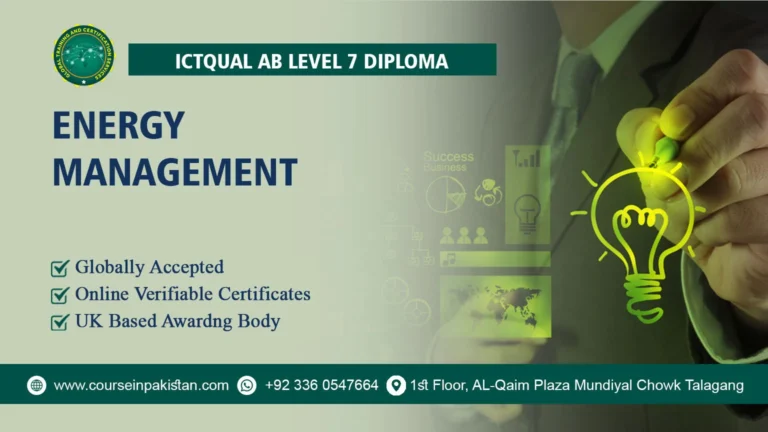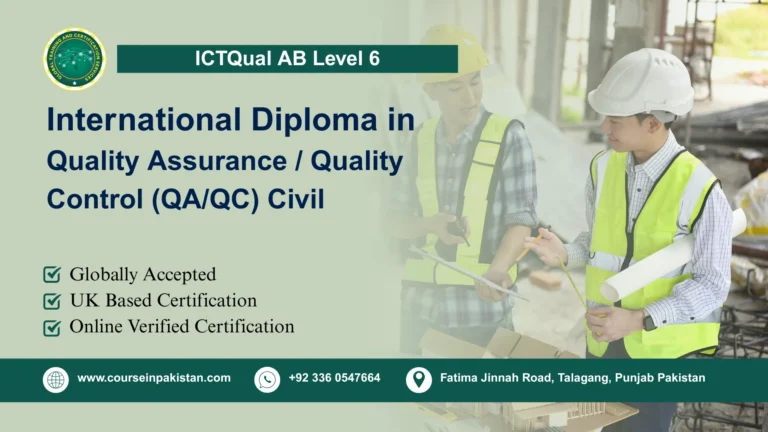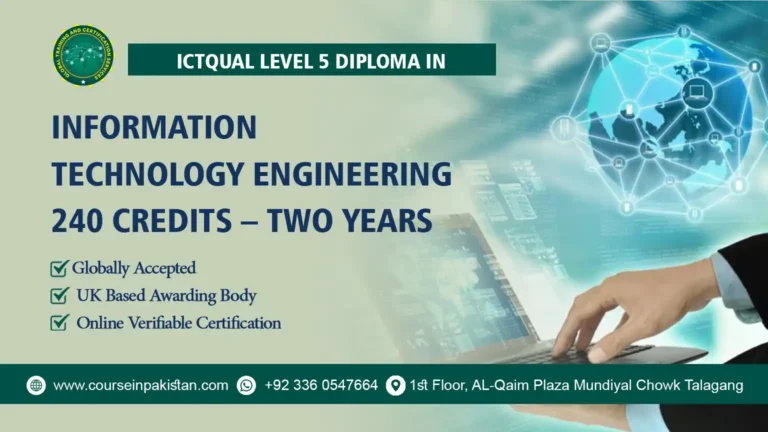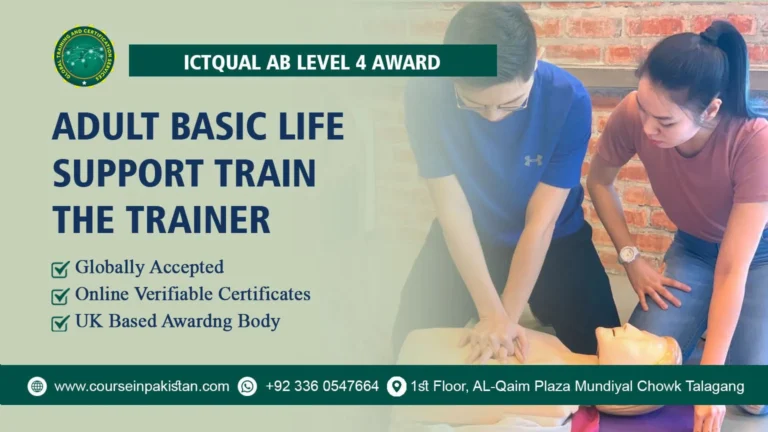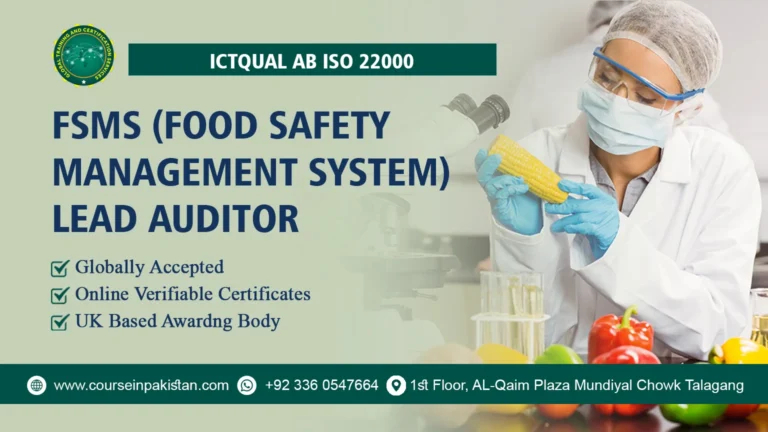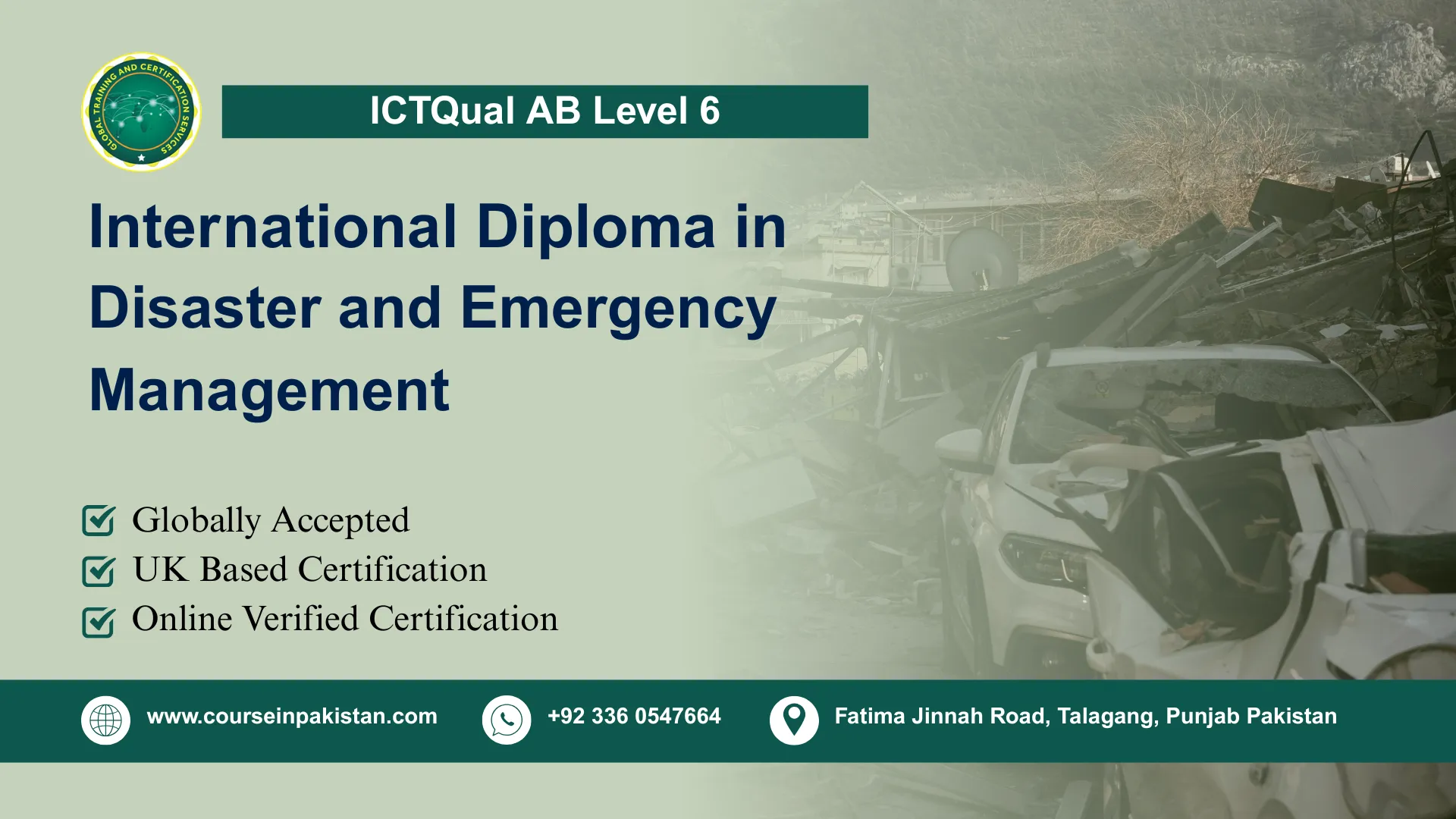
The ICTQual AB Level 6 International Diploma in Disaster and Emergency Management is a globally recognized qualification designed to equip learners with advanced knowledge and practical skills in disaster preparedness, emergency response, risk management, and crisis leadership. This comprehensive program covers a wide range of topics, including disaster risk reduction, emergency planning, humanitarian management, crisis communication, and recovery strategies. The course is ideal for professionals aspiring to lead disaster management operations, develop strategic plans for emergency situations, and implement effective safety protocols across public and private sectors.
This diploma combines theoretical knowledge with practical applications, preparing learners to respond effectively to natural and man-made disasters, manage emergency operations, and contribute to resilient communities. Learners will also develop critical thinking, decision-making, and leadership skills, enabling them to coordinate multi-agency responses and manage resources efficiently during crises.
Course Overview
The ICTQual AB Level 6 International Diploma in Disaster and Emergency Management is a comprehensive and globally recognized qualification that equips learners with advanced knowledge and practical skills in disaster preparedness, emergency response, risk management, and crisis leadership. This 360-credit, fully assignment-based diploma allows learners to study at their own pace from anywhere in the world. It is British Council verificable and MOFA and Embassy attestable, making it highly suitable for job placement and iqama approval. The course bridges theoretical knowledge with practical application, preparing learners to respond effectively to disasters, manage emergency operations, and lead crisis management teams across public, private, and humanitarian sectors.
This qualification is suitable for both fresh learners and experienced professionals. Fresh students are required to complete all 36 mandatory assignments within three years, while experienced and competent individuals with at least six years of relevant experience can complete the certification in a shorter time by submitting verifiable experience and defending their knowledge in professional discussion meetings with an ICTQual AB approved assessor, without completing all assignments. By the end of the program, learners will have developed strategic planning, leadership, and decision-making skills, enabling them to take up senior roles in government agencies, NGOs, humanitarian organizations, and private enterprises involved in disaster and emergency management.
Key Highlights of the Course:
- Fully 360-credit Level 6 diploma, flexible and self-paced study
- British Council verificable and MOFA/Embassy attestable qualification
- Suitable for fresh learners and experienced professionals with accelerated pathways
- Focus on practical skills, crisis leadership, and strategic disaster management
- Globally recognized for career advancement and iqama approval
Course Benefits
Career Advancement
- Prepare for leadership and managerial roles in disaster management, emergency response, and humanitarian organizations
- Enhance employability in government agencies, NGOs, and private sector emergency services
- Achieve recognition for expertise in disaster and emergency management
Professional Recognition
- Gain a British Council verified and MOFA/Embassy attestable qualification
- Improve credibility for international job placements and iqama approval
- Validate experience and skills through professional discussion assessments
Flexible Learning
- Complete the diploma entirely through assignments at your own pace
- Option for accelerated completion for experienced professionals
- Study from anywhere in the world without strict classroom attendance
Practical Skills Development
- Learn to manage disaster preparedness, risk assessment, and crisis response
- Develop strategic planning, leadership, and resource management skills
- Gain real-world competencies applicable in emergency management scenarios
Academic and Professional Pathways
- Foundation for advanced studies or certifications in disaster management, public safety, or emergency services
- Access to global professional networks and career opportunities in humanitarian and government sectors
Course Study Units
This qualification, the ICTQual AB Level 6 International Diploma in Disaster & Emergency Management, consists of 36 mandatory units.
Year 1 – Foundations of Disaster & Emergency Management
- Introduction to Disaster and Emergency Management
- Types and Causes of Disasters
- Principles of Risk Assessment and Management
- Emergency Planning and Preparedness
- Crisis Communication and Stakeholder Engagement
- Introduction to Humanitarian Response
- Disaster Legislation, Policies, and Governance
- Environmental Impacts of Disasters
- Resource Management in Emergency Situations
- Introduction to Project Management in Disaster Response
- Health and Safety in Disaster Management
- Ethical Considerations in Emergency Operations
Year 2 – Applied Disaster & Emergency Management Practices
- Advanced Risk Assessment and Vulnerability Analysis
- Disaster Mitigation Strategies
- Emergency Operations and Response Coordination
- Incident Command Systems and Leadership
- Humanitarian Logistics and Supply Chain Management
- Community Preparedness and Awareness Programmes
- Disaster Recovery and Rehabilitation Planning
- Crisis Management for Organisations and Institutions
- Use of Technology and Digital Tools in Disaster Management
- Environmental Sustainability in Disaster Operations
- Applied Research Methods in Disaster Management
- Operational Planning and Simulation Exercises
Year 3 – Strategic Leadership in Disaster & Emergency Management
- Strategic Leadership in Disaster Management
- International Disaster Management Frameworks and Standards
- Policy Development and Regulatory Compliance
- Advanced Crisis and Risk Communication
- Disaster Resilience and Business Continuity Planning
- Climate Change and Disaster Risk Reduction
- Emergency Preparedness for Critical Infrastructure
- Governance, Ethics, and Accountability in Disaster Management
- Innovation and Emerging Technologies in Emergency Response
- Strategic Planning and Resource Mobilisation
- Independent Research Project in Disaster & Emergency Management
- Capstone Project: Applied Disaster & Emergency Management
Learning Outcomes
Year 1 – Foundations of Disaster & Emergency Management
Introduction to Disaster and Emergency Management
- Understand the principles and scope of disaster and emergency management
- Explain the roles of various agencies and stakeholders in disaster response
- Recognize the importance of preparedness and strategic planning
Types and Causes of Disasters
- Identify natural, technological, and human-made disasters
- Analyze causes, patterns, and impacts of different disaster types
- Evaluate the effects of disasters on communities and infrastructure
Principles of Risk Assessment and Management
- Understand risk assessment frameworks and methodologies
- Apply risk identification, analysis, and mitigation strategies
- Evaluate potential hazards and develop risk management plans
Emergency Planning and Preparedness
- Develop comprehensive emergency plans and preparedness strategies
- Understand the principles of resource allocation and coordination
- Apply preparedness measures to reduce disaster impacts
Crisis Communication and Stakeholder Engagement
- Understand principles of effective crisis communication
- Develop strategies to engage and inform stakeholders during emergencies
- Evaluate communication plans for clarity, accuracy, and timeliness
Introduction to Humanitarian Response
- Understand the humanitarian response framework and key actors
- Apply principles of relief operations in disaster-affected areas
- Evaluate challenges in delivering humanitarian aid effectively
Disaster Legislation, Policies, and Governance
- Understand national and international disaster management legislation
- Apply governance frameworks to disaster response operations
- Analyze policies for compliance and operational effectiveness
Environmental Impacts of Disasters
- Identify environmental consequences of disasters
- Evaluate mitigation strategies to minimize ecological damage
- Apply sustainability principles in disaster management planning
Resource Management in Emergency Situations
- Understand resource allocation and logistics in emergencies
- Apply strategies for managing personnel, equipment, and materials
- Evaluate resource mobilization for efficiency and effectiveness
Introduction to Project Management in Disaster Response
- Understand project management principles applied to disaster scenarios
- Plan and monitor disaster-related projects
- Evaluate project outcomes for continuous improvement
Health and Safety in Disaster Management
- Identify health and safety risks during emergencies
- Apply safety protocols to protect responders and affected communities
- Evaluate measures to reduce occupational hazards in disaster settings
Ethical Considerations in Emergency Operations
- Understand ethical issues in disaster and emergency management
- Apply ethical decision-making in high-pressure situations
- Evaluate the impact of ethical practices on stakeholders
Year 2 – Applied Disaster & Emergency Management Practices
Advanced Risk Assessment and Vulnerability Analysis
- Conduct in-depth risk and vulnerability assessments
- Identify high-risk populations and infrastructure
- Develop strategies to reduce vulnerability and enhance resilience
Disaster Mitigation Strategies
- Understand disaster mitigation frameworks and techniques
- Apply structural and non-structural mitigation measures
- Evaluate mitigation strategies for effectiveness and sustainability
Emergency Operations and Response Coordination
- Develop operational plans for emergency response
- Coordinate multi-agency operations and communication
- Evaluate response efficiency and effectiveness
Incident Command Systems and Leadership
- Understand the structure and function of incident command systems
- Apply leadership principles in managing emergency incidents
- Evaluate decision-making and command effectiveness during crises
Humanitarian Logistics and Supply Chain Management
- Understand logistics planning for humanitarian operations
- Apply supply chain management principles in disaster contexts
- Evaluate logistical solutions for efficiency and timeliness
Community Preparedness and Awareness Programmes
- Develop community education and awareness initiatives
- Apply strategies to improve community resilience and participation
- Evaluate the impact of preparedness programs on risk reduction
Disaster Recovery and Rehabilitation Planning
- Understand post-disaster recovery and reconstruction principles
- Plan rehabilitation strategies for affected communities
- Evaluate recovery plans for sustainability and community impact
Crisis Management for Organisations and Institutions
- Develop organizational crisis management plans
- Apply decision-making strategies under high-pressure scenarios
- Evaluate organizational readiness for emergencies
Use of Technology and Digital Tools in Disaster Management
- Understand emerging technologies in disaster management
- Apply digital tools for communication, coordination, and monitoring
- Evaluate technological solutions for operational efficiency
Environmental Sustainability in Disaster Operations
- Integrate environmental considerations into disaster response
- Apply sustainable practices in emergency operations
- Evaluate environmental impact mitigation strategies
Applied Research Methods in Disaster Management
- Understand research methodologies relevant to disaster studies
- Collect, analyze, and interpret data to inform practice
- Develop evidence-based recommendations for disaster management
Operational Planning and Simulation Exercises
- Conduct scenario-based exercises to test emergency plans
- Evaluate operational readiness and effectiveness
- Apply lessons learned to improve disaster response strategies
Year 3 – Strategic Leadership in Disaster & Emergency Management
Strategic Leadership in Disaster Management
- Understand leadership principles in high-risk environments
- Apply strategic thinking to disaster planning and response
- Evaluate leadership effectiveness in managing crises
International Disaster Management Frameworks and Standards
- Understand global disaster management frameworks and standards
- Apply international guidelines to local operations
- Evaluate compliance with global best practices
Policy Development and Regulatory Compliance
- Develop policies aligned with disaster management objectives
- Ensure adherence to regulatory requirements
- Evaluate policy impact on operational performance
Advanced Crisis and Risk Communication
- Develop comprehensive communication strategies for crises
- Apply communication skills to high-pressure scenarios
- Evaluate stakeholder engagement and message effectiveness
Disaster Resilience and Business Continuity Planning
- Develop strategies to enhance resilience in organizations and communities
- Apply business continuity principles to maintain critical operations
- Evaluate resilience plans for effectiveness and adaptability
Climate Change and Disaster Risk Reduction
- Understand the link between climate change and disaster risk
- Apply adaptation and mitigation strategies
- Evaluate programs to reduce climate-related disaster impacts
Emergency Preparedness for Critical Infrastructure
- Assess risks to critical infrastructure in disaster scenarios
- Develop preparedness and protection strategies
- Evaluate effectiveness of infrastructure resilience measures
Governance, Ethics, and Accountability in Disaster Management
- Apply ethical and governance principles in decision-making
- Ensure accountability in disaster response operations
- Evaluate organizational practices against ethical and legal standards
Innovation and Emerging Technologies in Emergency Response
- Identify innovative solutions for disaster response and management
- Apply emerging technologies to enhance operational effectiveness
- Evaluate technological interventions for scalability and impact
Strategic Planning and Resource Mobilisation
- Develop long-term strategic plans for disaster management
- Plan and mobilize resources efficiently for operations
- Evaluate strategic initiatives for effectiveness and sustainability
Independent Research Project in Disaster & Emergency Management
- Conduct independent research addressing a relevant disaster management issue
- Apply qualitative and quantitative research methods
- Present findings and recommendations for professional practice
Capstone Project: Applied Disaster & Emergency Management
- Integrate knowledge and skills from the entire program into a practical project
- Apply strategic, operational, and leadership principles to real-world scenarios
- Demonstrate competence in planning, execution, and evaluation of disaster management strategies
Who is This Course For?
Aspiring Disaster Management Professionals
- Individuals aiming to start a career in disaster preparedness, emergency response, or humanitarian operations
- Fresh graduates seeking comprehensive knowledge of disaster and emergency management
Experienced Industry Practitioners
- Professionals working in emergency services, government agencies, NGOs, or private sector disaster management
- Individuals seeking to enhance leadership, operational planning, and strategic decision-making skills
Independent and Self-Motivated Learners
- Learners preferring a flexible, self-paced assignment-based study approach
- Individuals capable of completing assignments and assessments remotely from anywhere in the world
Future Leaders and Strategists
- Learners aiming for senior management or strategic roles in disaster and emergency management
- Professionals looking to develop skills in crisis leadership, risk assessment, and resource mobilization
Globally Oriented Professionals
- Individuals seeking a qualification verified by the British Council and attestable by MOFA/Embassy
- Professionals targeting iqama approval or international career opportunities in disaster management
Future Progression
- Senior leadership roles in disaster management, emergency response, and humanitarian organizations
- Strategic positions in government agencies, NGOs, and multinational emergency services
- Consultancy opportunities in risk assessment, crisis management, and disaster preparedness
- Opportunities to lead research, training, and policy development in disaster and emergency management
- Pathways to international roles requiring professional recognition and attested qualifications
Academic Pathways:
- Progression to postgraduate studies in Disaster Management, Emergency Management, or Humanitarian Leadership
- Advanced professional certifications or diplomas in risk management, emergency planning, or crisis leadership
- Specialization programs in climate change adaptation, resilience planning, or humanitarian logistics
- Access to professional networks and training programs for continuous career development
Conclusion
The ICTQual AB Level 6 International Diploma in Disaster & Emergency Management is a flexible, globally recognized qualification designed for both fresh learners and experienced professionals. With 36 mandatory units and 360 credits, the course develops advanced skills in disaster preparedness, risk management, crisis leadership, and strategic planning. Fresh students complete all assignments within three years, while experienced professionals with relevant experience can complete the program in a shorter time through professional discussion assessments. Verified by the British Council and attestable by MOFA and Embassy, this diploma equips learners with the expertise, credentials, and confidence to take leadership roles in government, humanitarian, and private sector disaster management operations, enhancing career prospects locally and internationally.

